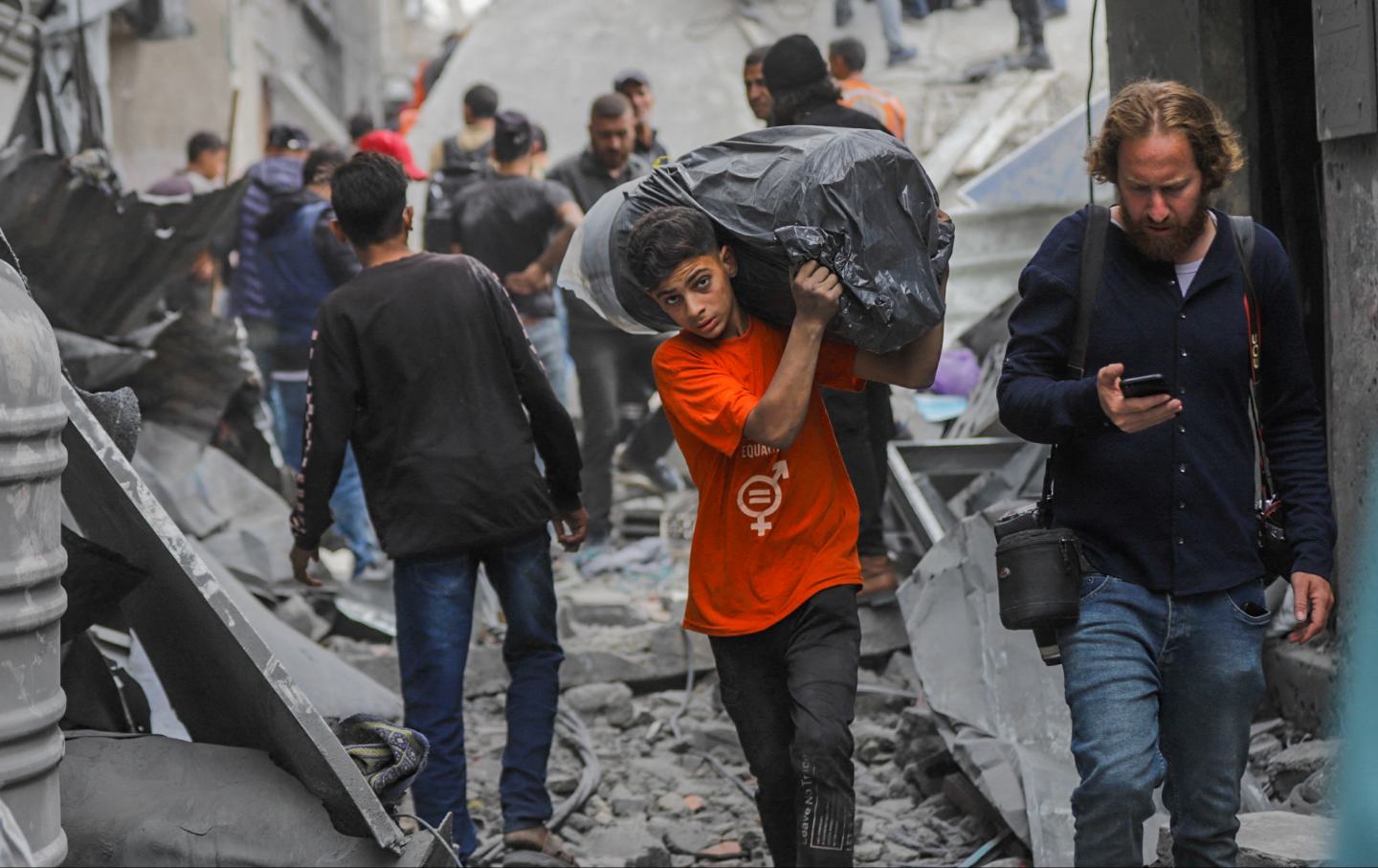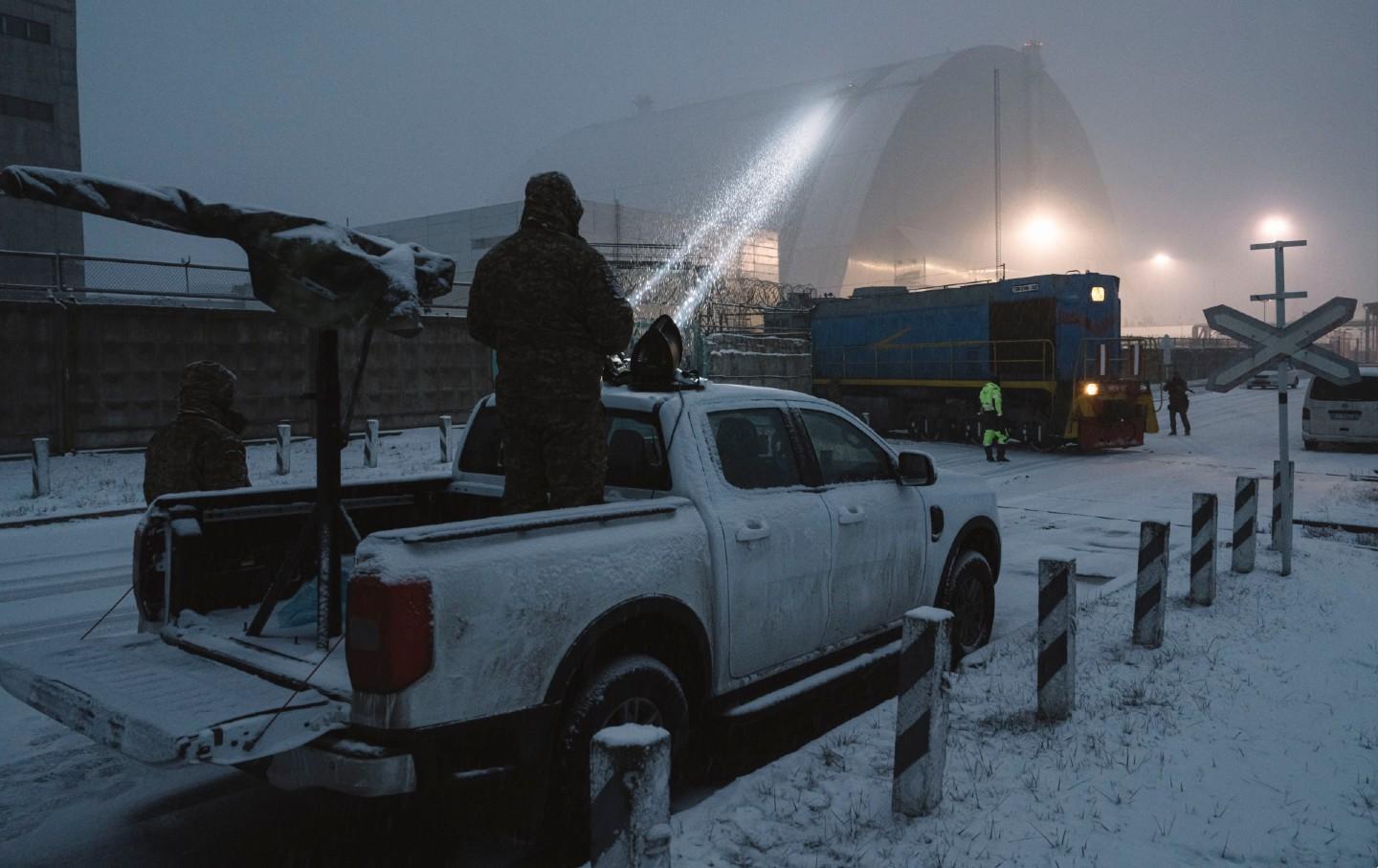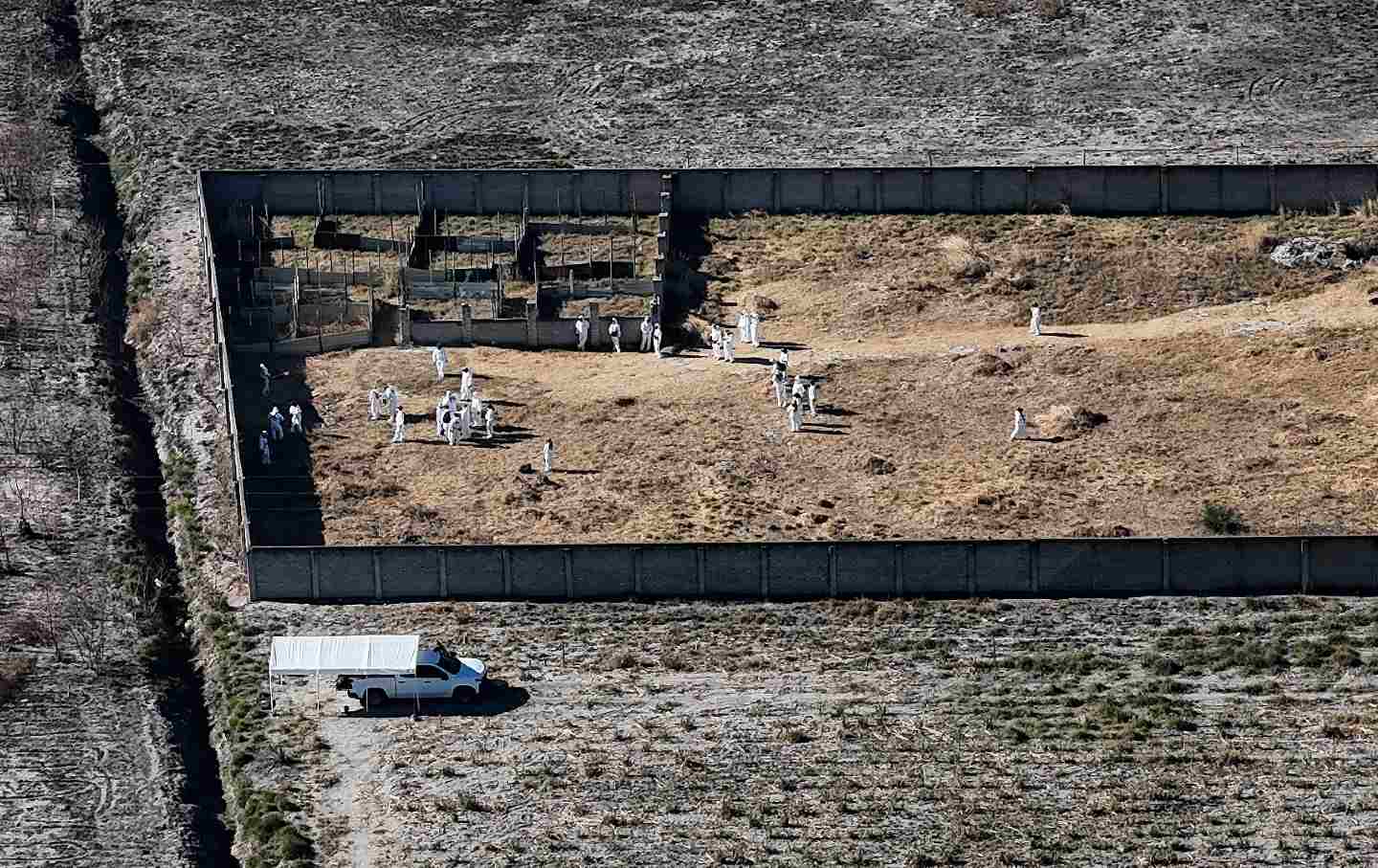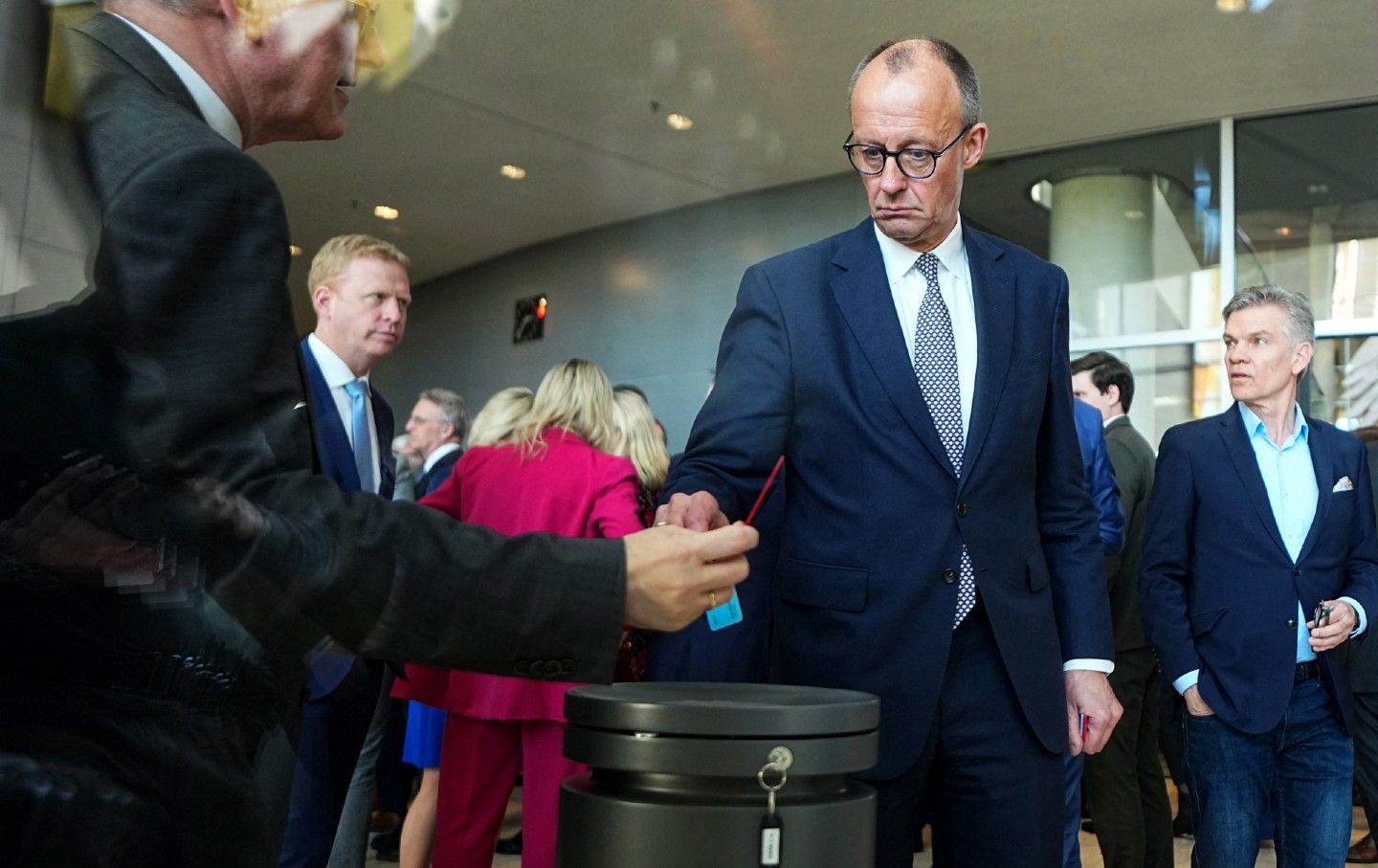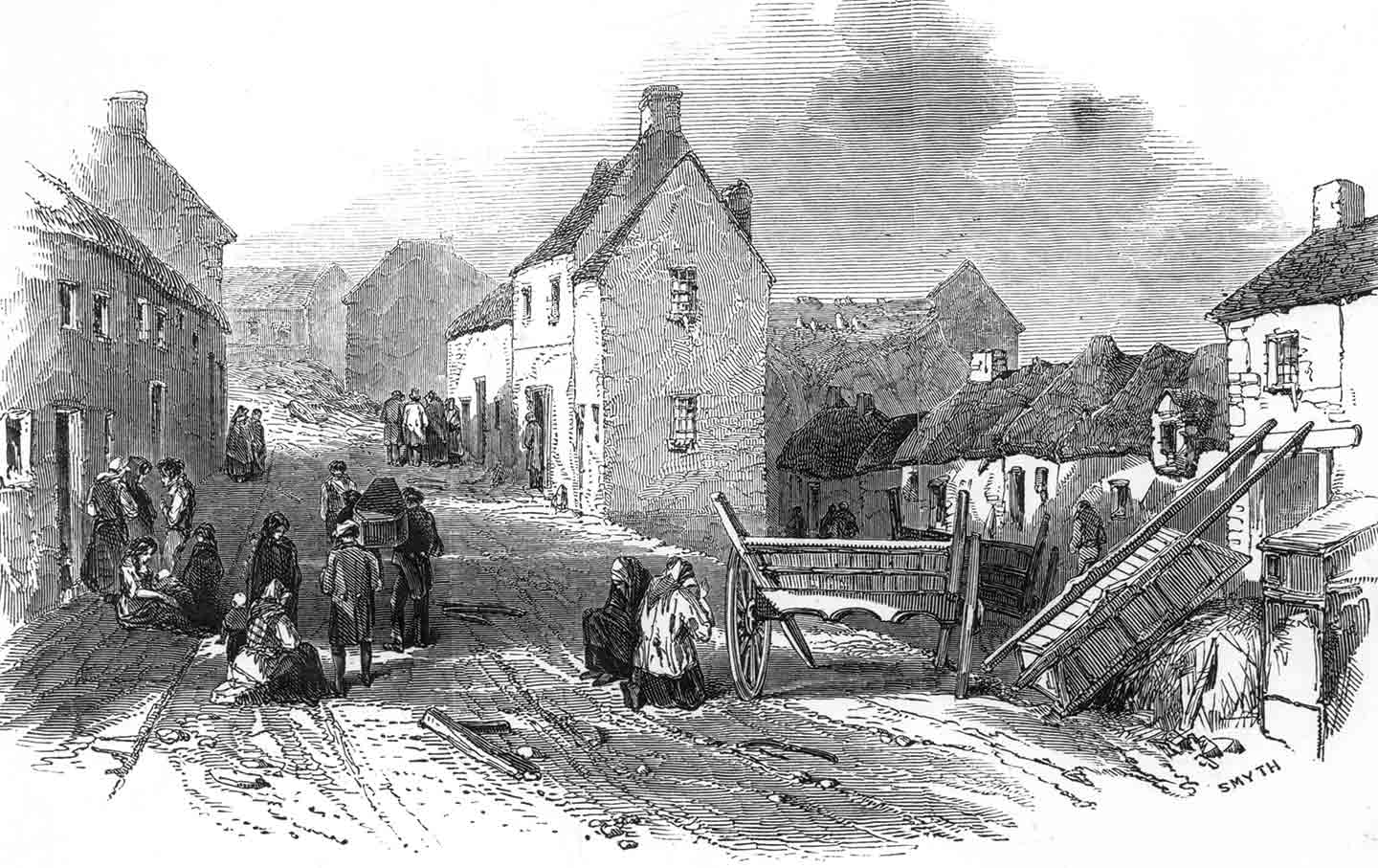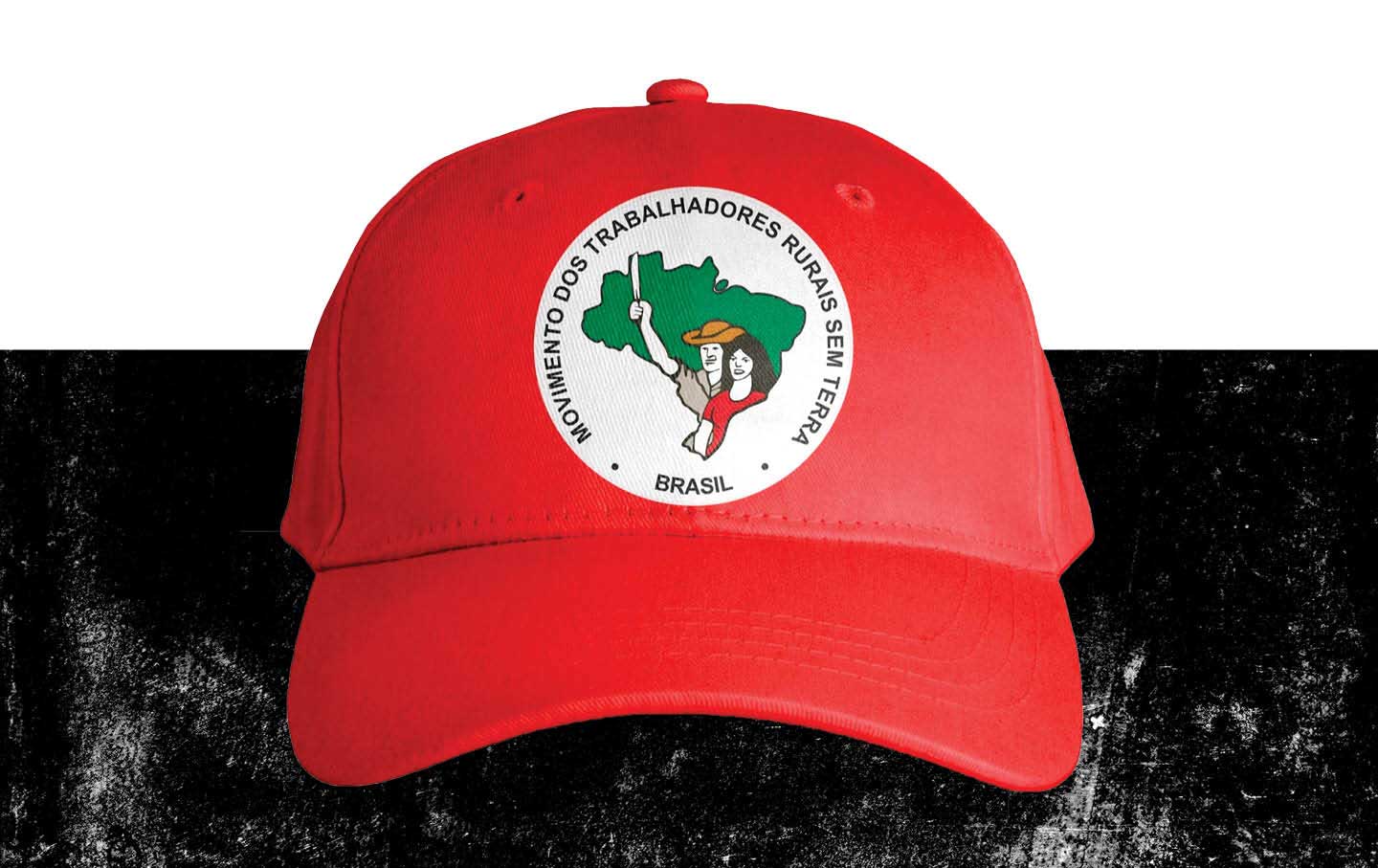“The Bulldozer Kept Coming”: A Girl Stares Down Death in Gaza
The extraordinary story of a 14-year-old, her mother, and what happened when the Israeli military came to destroy their house.
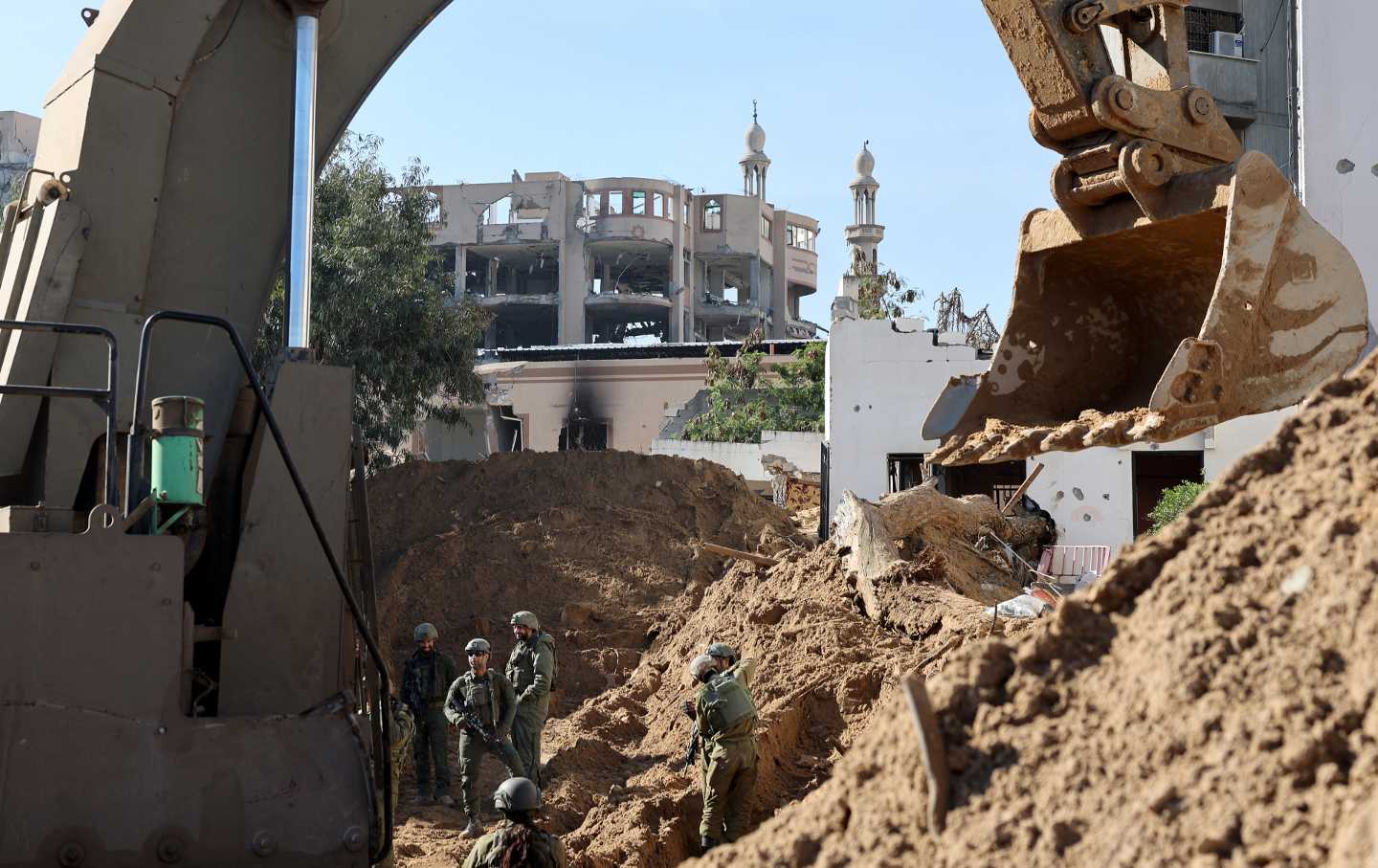
This picture taken during a media tour organized by the Israeli military on February 8, 2024, shows Israeli soldiers standing near a bulldozer inside Gaza City.
(Jack Guez / AFP via Getty Images)This story was originally written in Arabic by a 14-year-old Palestinian girl in Gaza named Lujayn. Along with one of Lujayn’s relatives, I have translated it into English. She initially wrote this story for her mother and then decided to share it with the world. It recounts her family’s forced displacement from the house where they were sheltering in Khan Younis. This was the fourth time Lujayn had been displaced since Israel’s assault on Gaza began.
Lujayn describes an increasingly common tactic of the Israeli military in her narrative: bulldozing buildings with people still inside. In addition, Lujayn’s story serves as a warning to the world about the dangers of Israel’s threatened invasion of Rafah. If she were displaced again, she and her family would have nowhere to go.
Lujayn is a brilliant student. She had been planning to go to university to study mathematics. But there are no more universities left in Gaza, and Lujayn has no permanent home. All she can do right now is survive and tell her story. For Lujayn as for many Palestinians, storytelling is a form of resistance. She asks the international community to take action to stop the Israeli military from killing her friends and threatening to kill her mother, her family, and herself. She particularly asks that the people of the United States of America pressure their elected representatives to stop funding Israel’s genocide.
—Rebecca Ruth Gould
This is what happened. On March 2, 2024, my dad went to bring us supplies from Rafah despite the danger on the road. He stayed overnight in Rafah because there was no transportation at night. That night, suddenly, the situation changed. The sound of explosions and missiles was everywhere.
My mom, me, and our extended family were sheltering together with four other families and eight unaccompanied children in a home in Khan Younis. We came out of our rooms and hid in the area beneath the staircase. There was gunfire and strange sounds everywhere. We tried to understand what was happening, but we couldn’t because there was shooting and chaos all around.
Mom kept telling me, “Don’t worry, we’ll be fine,” but I could see how she looked around anxiously. She told me, “I need to understand what’s happening. Stay away from the windows.”
I could see strange green light lines entering from the window, and I heard the sound of bullets. I told her, “No, it’s dangerous,” but she insisted. She said, “I have to understand what strange thing is happening.” So, I climbed under the staircase. She came back and she told me, “Come quickly.”
We hurried downstairs, and Mom told everyone: “The bulldozer is demolishing the house in front of ours, and the tanks have surrounded us from all sides. We need to get out quickly before they come towards us.” No one thought going out was a good idea. Mom told them that she would go out first. If they allowed her to pass, she would signal to us to come out. Everyone told her she shouldn’t go out. We knew that people were dying outside.
As we were talking, two teenage girls and three children suddenly came to the front door. One of them was covered in blood, crying, and screaming. They were the children of the family whose house had been demolished. Their father was also in Rafah like my father, but their mother, sister, and the rest of the family had been martyred under the bulldozer as it destroyed the house while they were inside. Everyone was stunned.
Mom told me to bring her my first aid supplies. She started to wipe the blood from the little boy and sterilize the wounds. Then she bandaged them while trying to comfort him.
Suddenly, we heard a loud noise. The bulldozer was coming for our house. Mom stopped and told me, “I must go out and try to stop them because we’ll die under the bulldozer. I’ll try to go out and tell them that we are civilians. If they hit me and let you all out, then you leave after me. If they hit me and continue to demolish the house, know that I tried everything I could with my last hope that you would be safe.”
I started crying. Everyone told her to stop, saying the army would kill her. At the same time, we could hear the bulldozer approaching. Mom quickly went out and stood in front of it, exactly in its path, and started telling them that there were civilians, women, elderly, and children in the house. The bulldozer kept coming.
Suddenly, a tank flashed its light and the bulldozer started backing away. As I was coming out of the house, I saw Mom next to the tank, refusing to move. Suddenly, green lines covered my mother’s body and head. I understood that the tank’s machine gun was aimed at her. I knew they were going to shoot at her while she stood there. I closed my eyes. Suddenly, the green light stopped flashing, and the tank started signaling, and two people from the house came down the stairs, carrying a white flag.
Everyone tried to understand what Mom was saying. The army was signaling for us to leave, and when the tank signaled with the green light, we understood that we should go to the nearby school. Mom moved quickly and urged us to leave. Everyone was trying to get out.
Popular
“swipe left below to view more authors”Swipe →Mom told me not to be afraid and lifted the injured boy up by his legs, while the girl carried her brother by his arms. We started walking behind the others. Mom was panting, and her breath was short. I understood that she needed her inhaler for her asthma. When I tried to give it to her, she said there was no time, just keep going quickly, don’t stop. If we stopped, bullets might hit us.
I don’t know how we made it to the school, but we were all safe. Mom made the boy sleep on the mattress and made sure he was okay. Then she sat me on a chair. It was two in the morning. Mom kept telling me not to worry.
A few hours later, the soldiers shouted in Arabic that we must clear the place through a certain route to another place. So we went outside. On both sides of the road, there were tanks, soldiers, and bulldozers. A soldier was speaking Arabic and selecting people, including women, to be arrested and taken to Israel. Those of us who remained were taken to a partly destroyed building three hundred meters away from the school. We stayed outside from nine or ten in the morning until eight at night, waiting in front of the entrance to the building.
Everyone started getting hungry and thirsty, especially the children. Suddenly the soldiers brought water bottles and started handing them out. Mom told us that we shouldn’t accept water from the occupation army, and that we would leave soon. She asked everyone to be patient, and added that if anyone couldn’t bear it, they could drink.
The little boy with us asked why. She told him it was because the soldiers were taking pictures of themselves while pretending to be kind to show the world how well they were treating people, but in reality they were demolishing houses on people’s heads and trampling them with their bulldozer at dawn. She was right. One of the soldiers was taking pictures, and we refused to take water from them.
I stood in front of the building’s entrance. I couldn’t even sit down when a soldier told me to sit and aimed his rifle at me. Mom came and stood in front of me, speaking forcefully in Arabic and English, telling him not to scare her daughter, as there was no room. There were elderly people next to me and if I sat so close to them, I might hurt them. For a moment, he aimed his weapon at her. She remained standing between me and him, the distance being approximately a meter and a half.
I was scared, but even more than that I was amazed and asked myself where Mom got this strength from.
Everyone was afraid, and most were crying, but she stood still, speaking and comforting me. The soldier left, and Mom sat me down. It was around eight in the evening. She placed me and the others with me in the middle, while she stood at the end near the soldiers. She told me: “If they let us go together, it would be good, but if they didn’t let me go with you, take the money and the phone. You’ll definitely find Dad outside.” She instructed the others where to go.
They separated us and took us for inspection. Strangely, they let us pass without any searching. We kept walking until we reached the last tank. Mom was holding my hand in one of her hands and the hands of the two little children in her other hand. Suddenly, the army was gone, and it was dark. Mom switched on the flashlight, and we saw Dad come running towards us from a distance. The father of the little children from the house we’d seen bulldozed was also approaching us, running. Dad hugged me tightly. Then I felt Mom stopping as if she had been waiting for this moment to catch her breath. I couldn’t believe we had made it out alive.
After this experience, Mother, I have to tell you something. I learned two things that I won’t forget. First, we must not let go of our strength, courage, and faith in God’s will at any moment. Second, we don’t turn our backs on those in need, no matter what. You didn’t leave the boy or his sisters alone. You carried their brother with them. You stayed by their side and told me: “They have no one else but us.” I won’t forget any of this. I’ve become certain that the occupation can never destroy our faith, our strength, our courage, our goodness, or our compassion.
I don’t know if the war will stop while we’re still alive, but what matters is that there are many people resisting with what is more important than weapons. Every day, a father walks under bombardment to feed us. A mother stands against bulldozers and tanks hoping to protect her daughter, knowing that even if she dies, what matters is that her daughter will live. A grandson carries his grandmother and never thinks of leaving her behind for even a moment. A sister pulls her brother out from under the rubble, away from death, and tries to save him.
Mom, this is my country, this is my people. Every generation of Palestinians will pass these lessons onto the next.
—Lujayn, Rafah, March 2024

